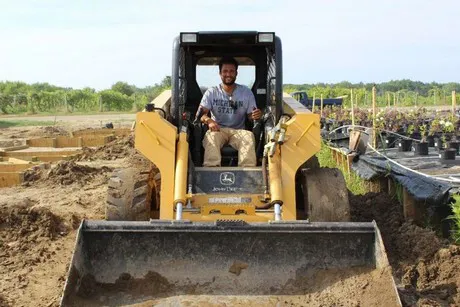Damon Abdi's interest in plants began during high school while working on landscaping projects for neighbors and friends. With a desire to learn more about plants and also with the thought of forming his own landscaping company, Damon decided to pursue an undergraduate degree in landscape contracting at Penn State. However, with his undergraduate degree almost done, Damon still had a longing to continue his education. He decided to pursue graduate school with the hope of being able to perform research in nursery crop production.

Damon’s graduate school search led him to Michigan State University, with the opportunity to work with Dr. Tom Fernandez on water and agrochemical management in container nursery production. Much of Damon’s first year and half was spent between the Horticulture Teaching and Research Center and hardware stores as his team constructed the several model nursery raised beds that can be found across from the grapevines at the farm. The beds are specially designed to allow precise measurement of runoff water and water infiltrating through the production surface during nursery production experiments. Over three years, Damon has measured water usage and runoff/infiltration volume and agrochemical content in experiments investigating various fertilization rates, substrates, irrigation methods, and pesticides in the production of seven ornamental species. His research has found, among other things, that with improved irrigation practices, growers can reduce water use by 50-80% with minimal effect on plant growth while simultaneously reducing the loss of chemicals which can pose a threat to people and the environment.
With his work at the farm wrapped up Damon is focusing on preparing his research for publication and his upcoming defense this winter. Looking ahead, Damon is still split between a career in academia or industry. He greatly enjoyed his classroom experience at MSU, assisting with various landscape horticulture classes and encouraging students to pursue the field. However, he has also realized that his extensive experience with water usage, loss, and associated chemical movement could be applicable to many industry opportunities with conservation-minded agendas.
